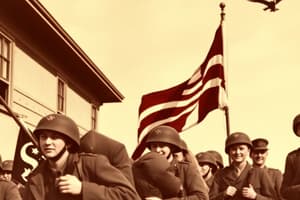Podcast
Questions and Answers
What was one of the tactics used to break the stalemate in trench warfare?
What was one of the tactics used to break the stalemate in trench warfare?
- Artillery bombardments (correct)
- Blockades
- Diplomatic negotiations
- Economic sanctions
What was a key factor in the outbreak of World War I?
What was a key factor in the outbreak of World War I?
- Capitalism
- Imperialism (correct)
- Communism
- Socialism
What was a consequence of the arms race and military buildup in Europe?
What was a consequence of the arms race and military buildup in Europe?
- Reduced tensions between nations
- Economic prosperity
- Creation of alliances
- Fear of being attacked or overwhelmed (correct)
What was an underlying cause of World War I?
What was an underlying cause of World War I?
What was introduced to overcome trench defenses?
What was introduced to overcome trench defenses?
What was one of the ways governments mobilized their economies during World War I?
What was one of the ways governments mobilized their economies during World War I?
What was one of the main consequences of the Treaty of Versailles?
What was one of the main consequences of the Treaty of Versailles?
What was a characteristic of the Battle of the Frontiers?
What was a characteristic of the Battle of the Frontiers?
What made it difficult to break through enemy lines in trench warfare?
What made it difficult to break through enemy lines in trench warfare?
What was one of the ways civilians contributed to the war effort on the home front?
What was one of the ways civilians contributed to the war effort on the home front?
Flashcards are hidden until you start studying
Study Notes
Home Front
- Economic Mobilization:
- Governments took control of industries to maximize production and allocate resources.
- Rationing and propaganda campaigns encouraged civilians to contribute to the war effort.
- Civilian Life:
- Women entered the workforce in large numbers, replacing men who went to fight.
- Food and fuel shortages led to widespread discontent and rationing.
- Nationalism and xenophobia increased, leading to anti-German sentiment in Allied countries.
Treaty of Versailles
- Key Provisions:
- Germany accepted responsibility for causing the war and agreed to pay reparations.
- Germany's military was limited, and the Rhineland was demilitarized.
- The League of Nations was established to promote international cooperation and prevent future wars.
- Consequences:
- Treaty was seen as unfair and punitive, leading to widespread resentment in Germany.
- Reparations and economic penalties contributed to Germany's economic instability and hyperinflation.
Major Battles
- Battle of the Frontiers (August-September 1914):
- Series of battles fought along the French-German border, resulting in heavy casualties.
- German advance halted, and the stalemate of trench warfare began.
- Battle of the Somme (July-November 1916):
- One of the bloodiest battles in history, with over 1 million casualties.
- Allied forces made small gains, but failed to break through German lines.
- Battle of Verdun (February-December 1916):
- Prolonged and brutal battle between French and German forces, resulting in heavy losses.
- German army suffered significant casualties, but failed to capture the city.
Trench Warfare
- Characteristics:
- Static, defensive warfare with soldiers dug in along trenches.
- Barbed wire, machine guns, and artillery made it difficult to break through enemy lines.
- Soldiers lived in harsh conditions, with poor sanitation, disease, and mental trauma.
- Tactics:
- Trench raids, artillery bombardments, and gas attacks were used to break the stalemate.
- New technologies, such as tanks and aircraft, were introduced to overcome trench defenses.
Causes of War
- Imperialism:
- Competition for colonies and resources led to tensions between European powers.
- Imperial rivalries and alliances created a complex web of relationships.
- Nationalism:
- Ethnic and nationalist tensions, particularly in the Balkans, contributed to the outbreak of war.
- Assassination of Archduke Franz Ferdinand of Austria-Hungary in June 1914 sparked the crisis.
- Militarism:
- Arms race and military buildup in Europe created an atmosphere of tension and competition.
- Fear of being attacked or overwhelmed led to a cycle of escalation and aggression.
Home Front
- Economic mobilization led to government control of industries to maximize production and allocate resources.
- Rationing and propaganda campaigns encouraged civilians to contribute to the war effort.
- Women entered the workforce in large numbers, replacing men who went to fight.
- Food and fuel shortages led to widespread discontent and rationing.
- Nationalism and xenophobia increased, leading to anti-German sentiment in Allied countries.
Treaty of Versailles
- Germany accepted responsibility for causing the war and agreed to pay reparations.
- Germany's military was limited, and the Rhineland was demilitarized.
- The League of Nations was established to promote international cooperation and prevent future wars.
- The treaty was seen as unfair and punitive, leading to widespread resentment in Germany.
- Reparations and economic penalties contributed to Germany's economic instability and hyperinflation.
Major Battles
- The Battle of the Frontiers (August-September 1914) was a series of battles fought along the French-German border, resulting in heavy casualties.
- The German advance was halted, and the stalemate of trench warfare began.
- The Battle of the Somme (July-November 1916) was one of the bloodiest battles in history, with over 1 million casualties.
- Allied forces made small gains, but failed to break through German lines.
- The Battle of Verdun (February-December 1916) was a prolonged and brutal battle between French and German forces, resulting in heavy losses.
- The German army suffered significant casualties, but failed to capture the city.
Trench Warfare
- Trench warfare was characterized by static, defensive warfare with soldiers dug in along trenches.
- Barbed wire, machine guns, and artillery made it difficult to break through enemy lines.
- Soldiers lived in harsh conditions, with poor sanitation, disease, and mental trauma.
- Trench raids, artillery bombardments, and gas attacks were used to break the stalemate.
- New technologies, such as tanks and aircraft, were introduced to overcome trench defenses.
Causes of War
- Imperialism led to competition for colonies and resources, creating tensions between European powers.
- Imperial rivalries and alliances created a complex web of relationships.
- Nationalism and ethnic tensions, particularly in the Balkans, contributed to the outbreak of war.
- The assassination of Archduke Franz Ferdinand of Austria-Hungary in June 1914 sparked the crisis.
- Militarism, including an arms race and military buildup in Europe, created an atmosphere of tension and competition.
- Fear of being attacked or overwhelmed led to a cycle of escalation and aggression.
Studying That Suits You
Use AI to generate personalized quizzes and flashcards to suit your learning preferences.




